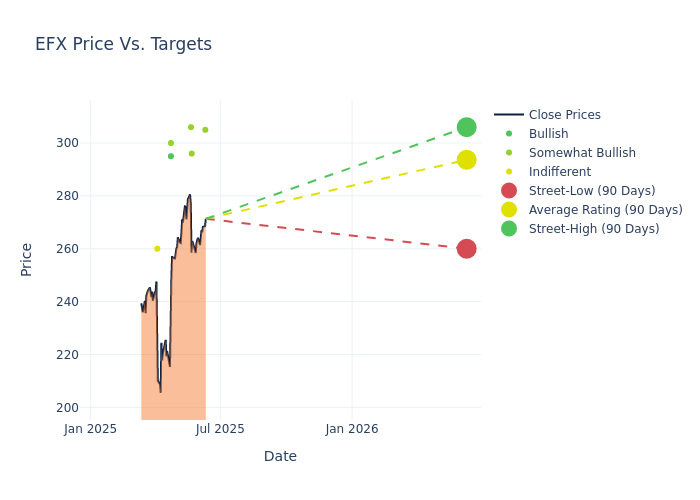Analyst Expectations For Equifax's Future
Across the recent three months, 7 analysts have shared their insights on Equifax (NYSE:EFX), expressing a variety of opinions spanning from bullish to bearish.
The table below provides a snapshot of their recent ratings, showcasing how sentiments have evolved over the past 30 days and comparing them to the preceding months.
| Bullish | Somewhat Bullish | Indifferent | Somewhat Bearish | Bearish | |
|---|---|---|---|---|---|
| Total Ratings | 1 | 5 | 1 | 0 | 0 |
| Last 30D | 0 | 1 | 0 | 0 | 0 |
| 1M Ago | 0 | 2 | 0 | 0 | 0 |
| 2M Ago | 1 | 2 | 0 | 0 | 0 |
| 3M Ago | 0 | 0 | 1 | 0 | 0 |
Insights from analysts' 12-month price targets are revealed, presenting an average target of $292.29, a high estimate of $306.00, and a low estimate of $260.00. A 2.24% drop is evident in the current average compared to the previous average price target of $299.00.

Analyzing Analyst Ratings: A Detailed Breakdown
A comprehensive examination of how financial experts perceive Equifax is derived from recent analyst actions. The following is a detailed summary of key analysts, their recent evaluations, and adjustments to ratings and price targets.
| Analyst | Analyst Firm | Action Taken | Rating | Current Price Target | Prior Price Target |
|---|---|---|---|---|---|
| Toni Kaplan | Morgan Stanley | Raises | Overweight | $305.00 | $295.00 |
| Owen Lau | Oppenheimer | Raises | Outperform | $296.00 | $277.00 |
| Jason Haas | Wells Fargo | Raises | Overweight | $306.00 | $288.00 |
| Ashish Sabadra | RBC Capital | Maintains | Outperform | $300.00 | $300.00 |
| Kyle Peterson | Needham | Maintains | Buy | $295.00 | $295.00 |
| Jason Haas | Wells Fargo | Lowers | Overweight | $284.00 | $313.00 |
| Manav Patnaik | Barclays | Lowers | Equal-Weight | $260.00 | $325.00 |
Key Insights:
- Action Taken: In response to dynamic market conditions and company performance, analysts update their recommendations. Whether they 'Maintain', 'Raise', or 'Lower' their stance, it signifies their reaction to recent developments related to Equifax. This insight gives a snapshot of analysts' perspectives on the current state of the company.
- Rating: Analysts assign qualitative assessments to stocks, ranging from 'Outperform' to 'Underperform'. These ratings convey the analysts' expectations for the relative performance of Equifax compared to the broader market.
- Price Targets: Analysts explore the dynamics of price targets, providing estimates for the future value of Equifax's stock. This examination reveals shifts in analysts' expectations over time.
Analyzing these analyst evaluations alongside relevant financial metrics can provide a comprehensive view of Equifax's market position. Stay informed and make data-driven decisions with the assistance of our Ratings Table.
Stay up to date on Equifax analyst ratings.
Discovering Equifax: A Closer Look
Along with Experian and TransUnion, Equifax is one of the leading credit bureaus in the United States. Equifax's credit reports provide credit histories on millions of consumers, and the firm's services are critical to lenders' credit decisions. In addition, over 40% of the firm's revenue comes from workforce solutions, which provides income verification and employer human resources services. Equifax generates just over 20% of its revenue from outside the United States.
Understanding the Numbers: Equifax's Finances
Market Capitalization: Positioned above industry average, the company's market capitalization underscores its superiority in size, indicative of a strong market presence.
Revenue Growth: Equifax's revenue growth over a period of 3M has been noteworthy. As of 31 March, 2025, the company achieved a revenue growth rate of approximately 3.79%. This indicates a substantial increase in the company's top-line earnings. In comparison to its industry peers, the company trails behind with a growth rate lower than the average among peers in the Industrials sector.
Net Margin: Equifax's net margin surpasses industry standards, highlighting the company's exceptional financial performance. With an impressive 9.23% net margin, the company effectively manages costs and achieves strong profitability.
Return on Equity (ROE): Equifax's ROE falls below industry averages, indicating challenges in efficiently using equity capital. With an ROE of 2.72%, the company may face hurdles in generating optimal returns for shareholders.
Return on Assets (ROA): Equifax's ROA lags behind industry averages, suggesting challenges in maximizing returns from its assets. With an ROA of 1.13%, the company may face hurdles in achieving optimal financial performance.
Debt Management: Equifax's debt-to-equity ratio is below the industry average. With a ratio of 1.0, the company relies less on debt financing, maintaining a healthier balance between debt and equity, which can be viewed positively by investors.
The Core of Analyst Ratings: What Every Investor Should Know
Ratings come from analysts, or specialists within banking and financial systems that report for specific stocks or defined sectors (typically once per quarter for each stock). Analysts usually derive their information from company conference calls and meetings, financial statements, and conversations with important insiders to reach their decisions.
Analysts may supplement their ratings with predictions for metrics like growth estimates, earnings, and revenue, offering investors a more comprehensive outlook. However, investors should be mindful that analysts, like any human, can have subjective perspectives influencing their forecasts.
Breaking: Wall Street's Next Big Mover
Benzinga's #1 analyst just identified a stock poised for explosive growth. This under-the-radar company could surge 200%+ as major market shifts unfold. Click here for urgent details.
This article was generated by Benzinga's automated content engine and reviewed by an editor.